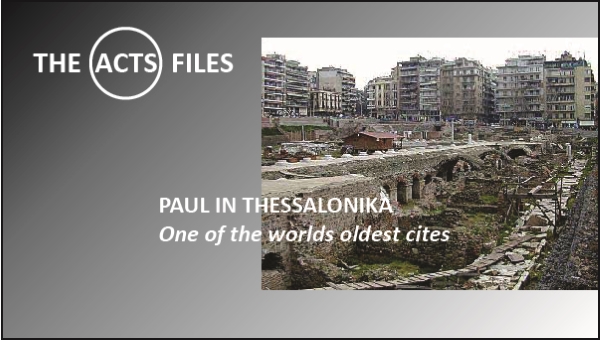By Tyson Thorne

When Paul arrived at Thessalonica (Acts 17.1-.9) he entered a city with a rich history. While an exact date of the cities founding is hard to come by, in 168 BC it became the capital of the second district of Macedonia. Located at the intersection of two important Roman roads (one from Italy and another from the Danube River to the Aegean Sea) it became the capital city of all of Macedonia in 146 BC. The cities importance to Rome became incalculable shortly before the birth of Jesus and continues to this day to be the second greatest city in all of Greece.
Paul had developed a method for church planting on his first missionary journey and it served him well throughout the province of Asia. In Europe, however, it wasn’t working out quite so well. In Philippi and now in Thessalonica Paul stuck to his template and started out at the Jewish synagogue. There he won some over to following the Messiah, so much so that the synagogue priests became jealous and looked for ways to discredit and remove Paul from the picture.
After at least three weeks of ministering in the city, the authorities sought out Paul at Jason’s home, likely because this was the location of the new home church (like Lydia’s home in Philippi). Luke informs us that Jason and some of the other “brothers” were brought up on charges before the politarches. This word, used only here in all Greek literature, was found at a site excavated in the modern city at the Vardar gate, several feet below a modern bus station.
Jason is heretofore unmentioned throughout the book, yet Luke refers to him as someone we should know. It may be that Jason has been a part of things in the past and Luke just never mentioned him. We know for certain that Jason later played a larger role in Paul’s ministry as he is mentioned in Paul’s letter to the Romans (Romans 16.21) as a “compatriot”. It has even been suggested that Jason was a relative of Paul’s, though little evidence exists to suggest such a tie. Regardless, we can discern from the Bible that Jason is a genuine follower of Jesus and willing to live his beliefs regardless of the consequences. Could the same be said of ourselves?
The heat fell on Jason and some of the other believers and they were arrested. Rather than prison, they escaped with just a fine but clearly the Jewish religious leadership was losing patience with Paul and the Jesus-followers. In Philippi they found charges that put Paul on the run and they intended to stick to this game plan just as Paul was sticking to his. Paul, Silas and Timothy set out immediately for another city, and along the way Paul had to rethink his strategy.
Europe was a different culture entirely. These people didn’t have the Old Testament background to their daily lives. Instead of Abraham and Moses and the prophets, they had Zeus and Apollo and Mercury. Europeans had no concept of a morally perfect God; their gods were broken and petty and just as sinful as humanity. Instead of a loving God that reached out to them, they had gods they needed to be freed from. But perhaps the difference that most impacted his ministry was the fact that there were fewer and fewer men of knowledge that could become the Elders and overseers every new church depended on. While this new environment produced challenges, Paul was sure God would enable the message to persist, even if at this point he didn’t know how.
|
|
|
